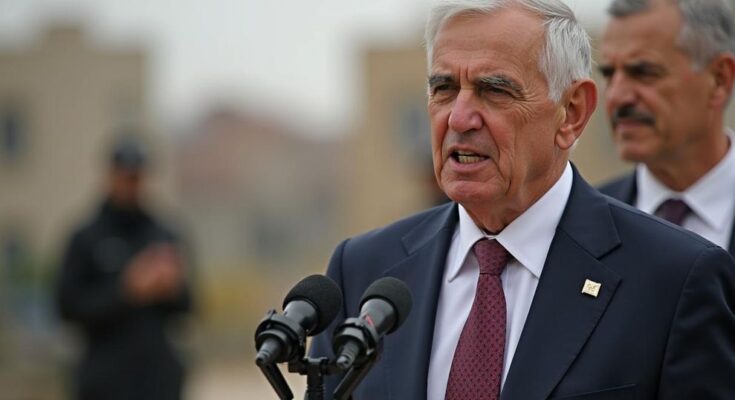Secretary of State Antony Blinken is assessing a post-war plan for Gaza, proposed by Israel and the UAE, to be unveiled post-election. Concerns have emerged regarding the marginalization of Palestinian Authority President Mahmoud Abbas. With no current options for a ceasefire or hostage negotiations, this plan may become a strategic element of the Biden administration’s legacy, albeit amidst contentious internal debates and significant resistance from various stakeholders within the region.
Secretary of State Antony Blinken is evaluating a post-war strategy for Gaza that has been shaped by proposals from Israel and the United Arab Emirates (UAE), with the intention of presenting it after the forthcoming presidential election. U.S. officials have expressed concerns that this plan may marginalize Palestinian Authority President Mahmoud Abbas and his administration, which aligns with the immediate objectives of Israel and the UAE. Currently, the absence of a deal to secure the release of hostages held by Hamas and to establish a ceasefire complicates the situation. Hence, introducing a plan for the period following the conflict could serve as a meaningful contribution to the Biden administration’s legacy regarding this ongoing issue. Discussions involving the Biden administration, Israel, and the UAE regarding potential plans have been underway for several months. Officials from the U.S., Israel, Palestine, and the UAE have engaged in talks, including the contributions of former British Prime Minister Tony Blair. Key meetings, such as those held last July between President Biden’s leading Middle East adviser, Brett McGurk, Israeli Minister for Strategic Affairs Ron Dermer, and Emirati Foreign Minister Abdullah bin Zayed, focused on the evolution of the proposed plan. The UAE’s proposal includes deploying a temporary international mission in Gaza tasked with providing humanitarian aid, establishing law and order, and preparing for future governance. A notable feature of this plan involves the UAE’s willingness to send soldiers to Gaza, contingent upon a formal invitation from the Palestinian Authority following substantive reforms and a change in its leadership. The Emirati approach appears aimed at diminishing the influence of President Abbas, whom they have characterized as corrupt and ineffective. They seek to replace current Palestinian Prime Minister Mohammed Mustafa, whom they view as a loyalist to Abbas. Importantly, the Emirati proposal emphasizes a politically unified vision for a two-state solution, although Israeli officials, including Prime Minister Netanyahu, have reservations regarding the Palestinian Authority’s involvement in the plan and the broader two-state vision. Recently, momentum surrounding the Israeli-Emirati plan has increased. Following discussions at the UN General Assembly, both Dermer and bin Zayed urged Blinken to help reconcile the differences between Israel and the UAE, potentially transforming the proposal into an American plan to be introduced post-election. One contentious issue under debate is the Emirati suggestion to reopen the U.S. consulate in Jerusalem as a gesture towards the Palestinians, a suggestion met with strong opposition from Israeli officials. Furthermore, the plan’s success hinges on clarifying the role of the Palestinian Authority, with the UAE advocating for a leading Palestinian figure in Gaza’s transition, while Israeli officials remain resistant to any immediate role for the Authority. Internally, the plan has sparked intense discussions within the State Department, illustrating divisions between Blinken’s advisers and more senior diplomats, which might complicate future diplomatic efforts. Blinken’s adviser Jaime Rubin has emerged as a proponent of the Israeli-Emirati plan, even as some within the White House express skepticism about its feasibility. A senior Palestinian Authority official voiced serious concerns regarding the Israeli-Emirati initiative, asserting that any alteration in Gaza’s governance without a national consensus would severely undermine the legitimacy of all involved.
The situation in Gaza has been exacerbated by ongoing hostilities between Israel and Hamas, creating a critical need for a structured political response once the conflict ceases. The complexities of Palestinian governance, particularly regarding President Mahmoud Abbas’s leadership and the demands from Israel and the UAE, highlight longstanding tensions within Palestinian politics. As the Biden administration looks to frame a post-war outlook, it grapples with the implications of involving the Palestinian Authority against a backdrop of Israeli resistance and regional dynamics that threaten to undermine any proposed solutions.
In conclusion, Secretary Blinken’s contemplation of a post-war plan for Gaza reflects a strategic attempt to address ongoing conflict dynamics while navigating the complex political landscape involving Israel, the UAE, and the Palestinian Authority. The proposed plans have garnered varied responses, revealing deep-seated divisions regarding leadership roles and political legitimacy that could profoundly impact Gaza’s future governance. Ultimately, achieving a sustainable resolution will require addressing these fundamental issues comprehensively and inclusively.
Original Source: www.axios.com




